Oakland Arena
Oakland Arena is an indoor arena located in Oakland, California, United States. From its opening in 1966 until 1996, it was known as the Oakland–Alameda County Coliseum Arena. After a major renovation completed in 1997, the arena was renamed The Arena in Oakland until 2005 and Oracle Arena from 2006 to 2019. It is often referred to as the Oakland Coliseum Arena as it is located adjacent to Oakland Coliseum. Oakland Arena seats 19,596 fans for basketball.
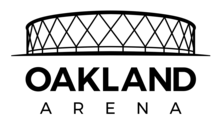 | |
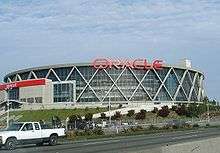 Venue viewed from I-880 (c. 2007) | |
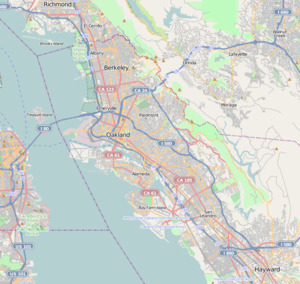 Oakland Arena Location in Oakland 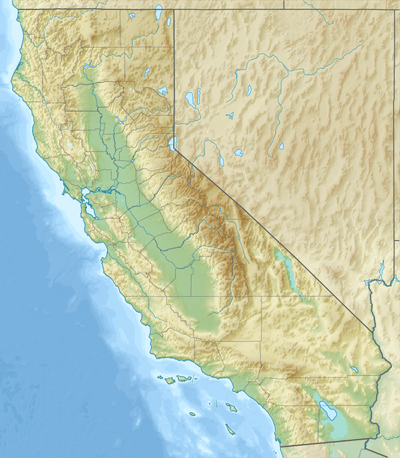 Oakland Arena Location in California  Oakland Arena Location in the United States | |
| Former names | Oakland–Alameda County Coliseum Arena (1966–1996) The Arena in Oakland (1997–2005) Oracle Arena (2006–2019) |
|---|---|
| Address | 7000 Coliseum Way |
| Location | Oakland, California |
| Coordinates | 37°45′1″N 122°12′11″W |
| Public transit | |
| Owner | Oakland-Alameda County Coliseum Authority (City of Oakland and Alameda County) |
| Operator | AEG |
| Capacity | Basketball: 19,596 |
| Construction | |
| Broke ground | April 15, 1964 |
| Opened | November 9, 1966 |
| Renovated | 1996–97 |
| Construction cost | US$24 million (original)[1] $121 million (1996–97 renovation) |
| Architect | Skidmore, Owings and Merrill[1] HNTB (renovation) |
| General contractor | Guy F. Atkinson Company[1] |
| Tenants | |
| California Seals (WHL) 1966–1967 Oakland Oaks (ABA) 1967–1969 California Golden Seals (NHL) 1970–1976 Golden State Warriors (NBA) 1971–2019 San Francisco Golden Gaters (WTT) 1974–1978 Golden Bay Earthquakes (NASL/MISL) 1982–1984 Oakland Skates (RHI) 1993–1995 California Golden Bears (NCAA) 1997–1999 Oakland Panthers (IFL) 2020– | |
History
Home franchises
The arena was the home of the Golden State Warriors[2] from 1971 to 2019; for the 1996–97 season, however, the team played at San Jose Arena while Oakland Arena underwent extensive renovations. The California Golden Bears of the Pac-10 played the 1997–98 and 1998–99 seasons at the arena while their primary home, Harmon Gym, was being renovated into Haas Pavilion. For some years before then, the Bears played occasional games against popular non-conference opponents at the arena.
The Oracle Arena has hosted games of the NBA Finals in 2015, 2016, 2017, 2018, and 2019, where the Warriors won the NBA championship in 2015, 2017, and 2018. That 2015 title was the first time since 1975 the Warriors won the title; however, Games 2 and 3 of the 1975 NBA Finals were played at the Cow Palace in San Francisco, as the Coliseum was unavailable at the time. The 2017 championship was the first time that a San Francisco-area team won a title in their home venue since the Oakland Athletics in the 1974 World Series.
The arena's first tenants were the California Seals of the Western Hockey League, who moved across the bay from the Cow Palace in 1966. The owners of the San Francisco Seals had been awarded an expansion franchise in the National Hockey League, on the condition they move out of the Cow Palace and into the then-new Oakland Coliseum Arena. The team changed its operating name from San Francisco Seals to California Seals in order to draw fans from both San Francisco and Oakland. The California Golden Seals continued to play at the arena after having transferred to the NHL, until the team moved to Cleveland after the 1975–76 NHL season.[3]
The Coliseum hosted the American Basketball Association's Oakland Oaks (1967–1969), a charter member of the new ABA in 1967. The Oaks signed San Francisco Warriors star Rick Barry away from the rival National Basketball Association in 1968. The team was owned by entertainer Pat Boone and also had stars Larry Brown and Doug Moe on its roster. Brown and Barry are in the Basketball Hall of Fame. After a 22–56 record in their first season, the Oaks went 60–18 during the regular season in 1968–69. The Oaks then defeated the Denver Rockets, New Orleans Buccaneers and finally the Indiana Pacers in the playoffs to capture the ABA Championship. However, the team was plagued by poor attendance and Boone sold the team following their ABA Championship. They were relocated to Washington and became the Washington Caps.[4]
The Bay Bombers (Roller Derby, 1966–1973) as well as the Golden Bay Earthquakes of the original MISL during the 1982–83 season and the Oakland Skates, a professional roller hockey team active from 1993 to 1995, all played there. WWE also holds professional wrestling shows at the arena.
In 2020, the Oakland Panthers of the Indoor Football League, co-owned by NFL All-Pro and Oakland native Marshawn Lynch, began play at the Oakland Arena.[5]
Renovation
Over three decades, the arena grew outdated, lacking the luxuries of newer ones. With just over 15,000 seats, it was one of the smallest venues in the league. Rather than building a new arena in Oakland, San Francisco or San Jose, the decision was made to proceed with a US$121 million renovation that involved tearing out much of interior and building a new seating bowl within the existing structure. The original walls, roof and foundation remained intact, similar to the rebuild of KeyArena in Seattle. The renovation began in mid-1996 and was completed in time for the Warriors return in the fall of 1997 (they played the 1996–97 season at the San Jose Arena, now the SAP Center at San Jose, home of the NHL's Sharks). Included in the renovation was a new center overhead LED scoreboard and 360-degree fascia display. The new configuration seats 19,596 for basketball.
Oracle naming rights deal

On October 20, 2006, the Golden State Warriors and Oracle Corporation announced that the Oakland Arena would be known as Oracle Arena for a 10-year term. A press conference was held on October 30.[6] "The O", as it is referred to, continued to be managed by Oakland–Alameda County Authority (JPA) and SMG. The JPA approved the deal at its November 10 meeting.[7]
After the Warriors' resurgence since the 2012–13 season until the 2018–19 season, Oracle Arena was reckoned as one of the loudest arenas in the NBA. It was often called "Roaracle" because of the painfully high decibel levels sometimes generated at Warriors games.[8][9] Shortly after the Warriors moved to San Francisco in 2019, the arena reverted to its old Oakland Arena moniker.
Attendance records
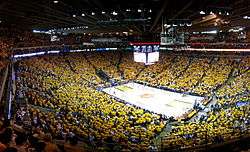
On May 13, 2007, 20,679 fans watched the Warriors lose to the Utah Jazz 115–101 in Game 4 of the Western Conference semifinals. This was the highest attendance in the Warriors' 61-year history.
That record lasted until December 14, 2007, when the Warriors hosted the Los Angeles Lakers and packed 20,705 into the Arena to set a new franchise attendance record.
The record was again broken on February 20, 2008, when the arena hosted 20,711 for the Warriors-Celtics game.[10]
This record was set yet again on April 10, 2008, when Oracle Arena hosted 20,737 fans in a Warriors loss to the Denver Nuggets.[11]
By the end of the 2016–17 regular season, Oracle had sold out 230 consecutive home games, a streak that continued throughout the team's playoff run. Oracle drew over 18,000 people per game for 12 straight seasons.[12]
Concerts
Elvis Presley kicked off his second tour of 1970 at the Coliseum on November 10, 1970. He would return again on November 11, 1972.
Marvin Gaye made his official return to live performing and touring at the Coliseum Arena on January 4, 1974 and this show was the basis for his 1 million-selling live album, Marvin Gaye Live! At the time, music industry executives cited the tour as a "heralded event" as Gaye made a comeback to live touring nearly 4 years after the death of his late singing partner Tammi Terrell.
Parliament-Funkadelic recorded half the album Live: P-Funk Earth Tour at the Oakland Coliseum Arena on January 21, 1977. The album was released in April of that year.
Queen performed concerts at the Oakland Coliseum Arena in 1978 and 1980, during their Jazz and Game Tours, respectively.
Nirvana performed concert at the Oakland Coliseum Arena in 1993, during their In Utero Tour.
KISS, an American rock band, played their final concert in the Bay Area with David Lee Roth of Van Halen on March 6, 2020.[13]
The Grateful Dead
The Grateful Dead played more concerts at this venue than at any other, with 66 shows between 1979 and 1995,[14][15] and their December 16, 1992 concert at the arena was released as Dick's Picks Volume 27, along with bonus tracks from their December 17, 1992 concert at the arena.
Warriors move across the Bay
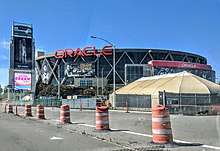
Early in 2013, the Warriors announced they would build a new arena in San Francisco and move back to the city.[16] It was originally suggested that the arena would be built on the decaying sites of Piers 30–32 near the foot of the Bay Bridge,[16] but the plan was met with opposition due to concerns about traffic, environmental impacts and obstruction of views.[17] In April 2014, the Warriors purchased 12-acres in Mission Bay as the site for a new 18,000-seat arena planned to open for the 2018–19 NBA season.[18] The new location eliminated the need for voter approval, which would have been required for the original site, though it had been unanimously approved by the San Francisco Supervisors in November 2012.[19] Because of delays due to litigation filed by arena opponents the opening season was pushed to the start of the 2019–20 NBA season.[20]
The new arena was named the Chase Center.[21] On January 9, 2019, the San Francisco Giants announced that their home AT&T Park would be renamed Oracle Park, with the Oracle naming rights moving there from the arena.[22] The Golden State Warriors played their final regular season game at Oracle Arena on April 7, 2019 with a 131–104 win over the Los Angeles Clippers. Notably, the team decided to wear their 2006-07 "We Believe" uniforms for that game, with the uniform choice not being revealed at any point beforehand until the Warriors players took off their warm-up uniforms shortly before tip-off, much to the delight of the home crowd.[23] The Warriors played their final playoff game at Oracle Arena on June 13, 2019, a 114–110 loss to the Toronto Raptors in Game 6 of the NBA Finals. The loss ended the Warriors' quest for a third consecutive NBA championship.
The arena remains open under its original name of the Oakland Arena after the Warriors' departure, and continues to be a popular concert venue in addition to being the home of the Oakland Panthers of the Indoor Football League beginning in 2020.
Seating capacity
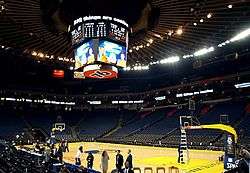
The seating capacity for basketball has expanded from 13,000 to 19,000 in over a half-century of use:[24]
| Years | Capacity |
|---|---|
| 1966–1972 | 13,502 |
| 1972–1973 | 12,905 |
| 1973–1974 | 13,123 |
| 1974–1976 | 12,787 |
| 1976–1977 | 13,155 |
| 1977–1980 | 13,237 |
| 1980–1982 | 13,239 |
| 1982–1984 | 13,335 |
| 1984–1985 | 13,295 |
| 1985–1986 | 15,011 |
| 1986–1997 | 15,025 |
| 1997–2019 | 19,596 |
References
- "PCAD - the Pacific Coast Architecture Database - Home". digital.lib.washington.edu.
- Suppes, BALLPARKS.com by Munsey and. "Oracle Arena". basketball.ballparks.com.
- Suppes, BALLPARKS.com by Munsey and. "Oakland/Alameda Coliseum". hockey.ballparks.com.
- "Remember the ABA: Oakland Oaks". www.remembertheaba.com.
- "Oakland Panthers Join IFL". GoIFL.com. 2019-09-10. Retrieved 2019-09-10.
- "Warriors, ORACLE Formally Announce Naming Rights Agreement For ORACLE Arena - Golden State Warriors".
- "Golden State Warriors, Oracle Reach Arena Naming Rights Agreement - Golden State Warriors".
- 'Roaracle' Is The Loudest NBA Arena, But Could All That Noise Affect Your Hearing? KCBS, 2015-06-04.
- Saracevic, Al. Explaining the 'Roaracle' Phenomenon. San Francisco Chronicle, 2013-05-19
- "Baron Davis hits last-second jumper in Warriors' 119–117 win over Celtics". The San Francisco Chronicle. Archived from the original on 2008-12-10.
- Jeff Maus (August 20, 2010). "Next for the Warriors: The Oakland Warriors? Or San Francisco Bound?". Bleacher Report.
- "Warriors Conclude 2016-17 Regular Season with 230 Consecutive Sellouts". NBA. April 12, 2017.
- Ahner, Raymond (March 10, 2020). "KISS at Oracle Arena on Friday, March 6, 2020". SF Weekly. Retrieved July 30, 2020.
- "The SetList Program - Grateful Dead Setlists, Listener Experiences, and Statistics". www.setlists.net.
- "venues". www.deadlists.com.
- Matier, Phillip (February 15, 2013). "Warriors to build new arena, move back to S.F." San Francisco Chronicle (SF Gate). Retrieved 8 May 2014.
- Knight Perrigan, Heather (May 22, 2012). "Golden State Warriors owners make a risky play". The San Francisco Chronicle. Retrieved May 22, 2012.
- Cote, John (April 22, 2014). "Warriors shift arena plans to Mission Bay". San Francisco Chronicle (SF Gate). Retrieved 1 April 2016.
- "Board gives Warriors' arena initial green light". The San Francisco Chronicle.
- "Golden State Warriors Delay Opening of San Francisco Arena to 2019". ABC 7 News. January 15, 2016. Retrieved 1 April 2016.
- Dineen, J.K. (January 27, 2016). "Warriors arena to be named Chase Center — bank buys naming rights". San Francisco Chronicle. Retrieved January 26, 2019.
- Schulman, Henry (January 9, 2019). "SF Giants' home now called Oracle Park after AT&T split". San Francisco Chronicle. Retrieved January 26, 2019.
- Golden State Warriors Surprise Everyone, Wear Forgotten Throwbacks
- "2011-2012 Golden State Warriors Media Guide" (PDF). Archived from the original (PDF) on 2018-02-16. Retrieved 2012-04-25.
External links
| Wikimedia Commons has media related to Oakland Arena. |
| Events and tenants | ||
|---|---|---|
| Preceded by War Memorial Gymnasium & San Francisco Civic Auditorium Cow Palace |
Home of the Golden State Warriors 1966–1967 1971–1996 1996–1997 1997–2019 |
Succeeded by Cow Palace San Jose Arena Chase Center |
| Preceded by Madison Square Garden |
WTA Tour Championships venues 1978 |
Succeeded by Madison Square Garden |
| Preceded by Olympiahalle, Munich |
World Figure Skating Championships Venue 1992 |
Succeeded by Sportovní hala, Prague |
| Preceded by first arena |
Home of the California Golden Seals 1967–1976 |
Succeeded by Richfield Coliseum (as Cleveland Barons) |
| Preceded by Madison Square Garden |
Host of the NBA All-Star Game 2000 |
Succeeded by MCI Center |